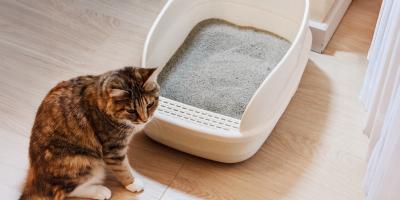Why is My Cat Peeing on My Bed?


Every cat owner has been there – you walk into your room and find cat pee where it’s not supposed to be. But before you assume your cat is mad at you, know that this is not revengeful behavior on your cat’s part. If your cat is peeing outside their litter box, especially on soft surfaces like your bed, it might mean that something is going on with them. Here, learn why your cat might be peeing on your bed and what to do about it.
Why Did My Cat Pee on My Bed?
If your cat is peeing outside of the litter box, here are some of the most common reasons:
- They are unwell: Your cat might be sick, especially if they are peeing on your bed out of nowhere. A vet can confirm any illnesses.
- They’re marking their territory with scent: If your cat is trying to claim a place as theirs, they’ll do it with scent. Your bed is likely prime real estate that they are trying to claim, especially if there’s something new in the house, like a new pet or guest.
- They’re stressed: Your cat might be anxious and is peeing on your bed as a way to express that. Deviation from routine, moving, or even simple things like having guests stay over might be making your cat stressed out. By peeing on your bed, they’re comforting themselves, as weird as that sounds.
- Something’s up with their litter box: Most cat owners know that the litter box setup is sacred to a cat, so if it’s dirty, in a hard-to-reach spot, or in a high-traffic area, they might simply find somewhere else to relieve themselves.
- They want attention: Just like a dog might eat an owner’s shoe, a cat might go to the bathroom on an owner’s bed to get attention. This is a rare behavior, and other reasons listed prior are often the culprit and should be ruled out first.
Medical Conditions That May Cause a Cat to Pee on Your Bed
If peeing on your bed is unusual behavior for your cat, something medical might be up. Here are some common medical conditions that often cause cats to pee outside the litter box:
- Bladder stones or crystals: Bladder stones in cats is a painful condition. They cause serious irritation or even blood in your cat’s urine. Your cat might be confused about what’s going on and pee outside the litter box as a result.
- Urinary tract infection: While you might think your cat has a urinary tract infection (UTI), it’s not very common in cats. Instead, they may suffer from an irritation to the bladder called Feline Idiopathic Cystitis (FIC). There is no known cause. Many cats with FIC have similar urinary signs to UTIs and bladder stones.
- Kidney disease: Kidney problems might mean that your cat needs to go more often, and they can’t make it to the litter box in time.
- Diabetes: Like kidney disease, diabetes in cats can make them more thirsty and therefore more likely to urinate. If your cat is super thirsty and has more accidents than normal, it could be diabetes.
- Arthritis: Older cats with arthritis might struggle to get into higher-sided litter boxes, forcing them to go elsewhere.
- Cognitive dysfunction (feline dementia): Like older humans, cats can get dementia as they age. Senior cats may become confused and simply forget how to go to the bathroom as they were trained.
If you see any of these signs or other worrying symptoms, call your vet.
Behavioral Conditions That May Cause a Cat to Pee on Your Bed
Once your vet has determined that there are no serious medical issues with your cat, it might be down to behavioral ones, such as:
- Stress and anxiety: Despite their aloof reputation, some cats can get stressed easily. Things like moving, a new baby or new pet, guests, or even simply rearranging furniture can stress them out.
- Separation anxiety: Separation anxiety is not just for dogs – some cats don’t like being left alone. Cats with separation anxiety might urinate on your bed to comfort themselves, and this act may cue you into an anxious and/or frustrated cat.
- Litter box aversion: Cats can be fussy about the bathroom. If they don’t like their setup, they might not use it and find somewhere else to go. Consider changing things like getting a less scented litter, cleaning the box more often, trying a different type of litter box, or moving the box to a low-traffic area.
- Multiple cats: There can be tension if there is more than one cat in the house. They might get territorial, and that can cause one cat to have to flee the litter box and find another place to go.
How to Stop a Cat from Peeing on Your Bed
Now that you know why your cat might be peeing on your bed, here are a few ways to stop them and prevent it from happening again if it continues:
- Figure out health conditions. A medical condition is not the result of any behavioral issues. Visit your vet to find out if something is up with your cat’s health. You can also self-monitor at home with a smart litter box, like the Petivity Smart Box Litter Monitor System, which tracks data that might be helpful to your vet to diagnose urinary issues such as UTIs, kidney disease, and more.
- Upgrade the litter box. Cats can be picky, so try these litter box tips to make it a good experience for them:
- Scoop litter daily.
- Refresh cat litter regularly.
- Try different types of litter to see what your cat likes or doesn’t like.
- Try an open versus a closed litter box.
- Put it in a quiet, low-traffic area where they can access it easily.
- Reduce stress. Cats can get stressed out, leading to peeing on your bed and elsewhere. Help your cat out by making sure you have a consistent routine and plenty of stimulation. If you need to, bring in calming pheromone diffusers or consult your vet if it gets bad enough for antianxiety meds.
- Reinforce good litter box habits. Cats can be trained to do lots of things, including specific litter box training. Use consistent positive reinforcement methods and praise them or offer treats when they follow directions.
- Discourage them from peeing on the bed. Cats don’t like the way some materials feel, like aluminum foil or double-sided tape. Putting them on the bed will help them learn it’s not a place to hang out – or pee. You can prevent access altogether by closing bedroom doors or limiting cats to certain areas around the house. Even a short-term break could help kick the habit.
- Don’t punish them. Never punish a cat for peeing on the bed. Instead, get to the root problem and work on it with your cat.
- Give them their own space. Adding appropriate resting spots, like a cat bed or tree, can help them know that they have their own space. Use positive reinforcement to get the cat to understand that a bed or tree is their domain. The reinforcement of their scent in these areas can help provide comfort as well, and make it a place they want to return to instead of your bed.
- Make sure they get plenty of enrichment. Cats need mental stimulation to tire their smart brains out. Puzzles, games, and more can help create positive time together and help quell any anxiety.
How to Get Cat Pee Out of Your Mattress and Bedding
You can save your bed or mattress if your cat pees on it, but you’ll want to act fast to eliminate the odor. Here’s how to get cat pee out of a mattress and how to get cat pee out of bedding:
How to Get Cat Pee Out of a Mattress
- Blot up as much urine as you can with a cloth or paper towels after removing the sheets.
- Sprinkle baking soda over the affected area.
- Fill a spray bottle with equal parts white vinegar and water and spray on the pee.
- Allow it to sit for several hours or overnight if you can before vacuuming it up.
- If you need to, apply an enzymatic cleaner.
- Let the mattress dry completely before putting the bedding back on.
How to Get Cat Pee Out of Bedding
- Soak sheets, blankets, or comforters in cold water before washing.
- Wash the cat pee bedding in the hottest water safe for the fabric.
- Add a laundry booster if you think it needs it.
- Air dry if possible, as high heat can set in any lingering odor.
- Repeat if needed.
Conclusion
You can solve issues with your cat peeing on your bed with patience, time, and some detective work. Keep your environment stress-free, rule out medical issues, and use training to get your cat back on track.
For more expert tips on caring for your cat, explore our other cat routine care articles.

Earn myPurina Rewards with Every Purchase
Use your points for treats, toys, and gift cards with myPurina app.



